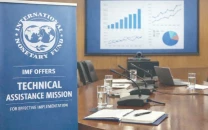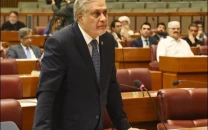Not bold enough
There are no bold measures in the ‘shadow’ budget of the PTI that seem capable of kick-starting the economy

The writer served as Executive Editor of The Express Tribune from 2009 to 2014
Budget-making is a highly technical job. In developed democracies, these annual balance sheets usually flow out of a long-term economic vision based on national objectives designed by bipartisan political thought. However, since the official budgetary proposals for the next financial year, like the last two budgets of the PML-N government, were overwhelmingly based on the International Monetary Fund’s (IMF) austerity prescription, the national economy appears to have entered a slow-motion mode. Shackled by the Fund’s highly restrictive conditions, the government seems to have settled for an ‘austere’ national economy.
The ‘shadow’ budget of the PTI also does not seem to have been inspired by any long-term economic vision. Neither does one see any economic philosophy behind the proposed measures. It seems to be more of a reactive document. Anticipating one more IMF-prescribed official budget, the PTI has come up with ‘shadow’ proposals that sound more like an accountant’s budget rather than one backed by any profound political thought. There are no bold measures in the proposals that seem capable of kick-starting the economy. Neither are there any measures in these proposals aimed at exploiting Pakistan’s comparative economic advantages.
The entire document reflects a kind of subservience to the infamous Washington Consensus. One could not find any measure in the ‘shadow’ proposals that seems to be directed at liberating the national economy from the clutches of market forces as envisaged in a capitalist system. Indeed, nothing seems to have been proposed to create the right environment where the economy could be orchestrated by social market forces that discourage a free-for-all and hasten the setting up of autonomous, statutory regulatory bodies capable of keeping both the government and the private sector from taking the market for a ride, but without in any way interfering with the private sector-led growth and at the same time discouraging policies that encourage acute inequalities seen today even in the developed rich world.
There are many noted economy-savvy personalities in the PTI. The long list includes persons who have seen the inner workings of governments, like Shah Mehmood Qureshi and Jehangir Tareen and those who have managed huge corporations from commanding heights, like Asad Umar. Noted Pakistani economist Saqib Shirani is also said to have helped in drafting the proposed ‘shadow’ budget. What these gentlemen have produced is certainly an intelligent document of alternative measures, but it is not bold enough to set the economy on the course to what is called inclusive growth.
Some notable features of the PTI’s ‘shadow’ budgetary proposals include: a reduction in the standard sales tax rate to 12.5 per cent, a reduction of five per cent each year in the headline corporate tax rate until it reaches 20 per cent (the lowest in the region) and the removal of the Gas Infrastructure Development Cess. This huge tax relief, amounting to Rs242 billion in the first year, is meant, according to the authors of the proposals, to: 1) stimulate economic activity by increasing disposable incomes, reducing the tax burden of documented businesses and encouraging new investment; and 2) lower penal tax rates which is expected to be helpful in encouraging greater tax compliance. To pay for this, the PTI shadow budget proposes: 1) the introduction of an adjustable minimum assets tax; 2) the imposition of capital gains tax on properties; 3) treating all sources of income in a non-discriminatory manner for tax purposes; 4) introducing a windfall profits tax for certain sectors; and 5) using NADRA and allied official databases to widen the pool of taxpayers. NADRA has given a list of 3.2 million affluent Pakistanis not on the tax register.
In addition, the party’s ‘shadow’ budget places emphasis on: 1) plugging the leakages at the Federal Board of Revenue; and 2) controlling corruption and waste in public sector expenditures.
Published in The Express Tribune, June 17th, 2015.
Like Opinion & Editorial on Facebook, follow @ETOpEd on Twitter to receive all updates on all our daily pieces.















COMMENTS
Comments are moderated and generally will be posted if they are on-topic and not abusive.
For more information, please see our Comments FAQ